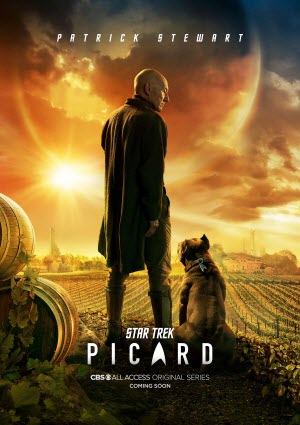Star Trek: Picard
 We all knew that this was going to be an exercise in nostalgia. Jean-Luc Picard would probably win any poll of favourite Star Trek captains hands-down, and Patrick Stewart is a superb actor who has gone on to wow the geek community in other roles as well. In some ways, therefore, it was a project that had no risks. All it had to do was deliver fan service.
We all knew that this was going to be an exercise in nostalgia. Jean-Luc Picard would probably win any poll of favourite Star Trek captains hands-down, and Patrick Stewart is a superb actor who has gone on to wow the geek community in other roles as well. In some ways, therefore, it was a project that had no risks. All it had to do was deliver fan service.
Thankfully that’s not all that the creators wanted. If they had, they would never have hired a writer as capable as Michael Chabon to craft the story arc. So the question most people will have been asking themselves is whether Chabon would manage to deliver the required nostalgia-fest and still produce a story worthy of Next Gen. And, of course, whether he could do that with a lead character and lead actor who are both getting a bit geriatric.
Wisely Chabon chose to focus on the most interesting philosophical question posed by Next Gen stories: the problem of artificial life. On the one hand we have Commander Data, by far the most interesting member of the Enterprise crew, who is an android who wants to be accepted as human. On the other we have the Borg, people who have become mere cogs in a giant machine intelligence.
Data, of course, is dead. He was killed saving Picard’s life in the film, Star Trek: Nemesis. I gather that film is almost universally despised by Trek fans. I watched it, and it didn’t seem that bad, though I’m afraid I will always find the Romulans to be very silly because the idea of an inter-stellar empire based on ancient Rome belongs in a Patricia Kennealy novel, not Star Trek. I asked about Nemesis on Twitter and apparently the director had said and done some pretty dumb things at the time, but my suspicion is that it is hated mainly because it kills off a well-loved character.
On the other hand, Data was an android, so it should be entirely possible to decant his personality into a new body. There was therefore a possibility that this series might bring him back. Whether it does or not, I will have to leave as a mystery. What it does do, fairly early on, is introduce us to his daughters.
Most science fiction is not really about the future, it is about the now. Any new Star Trek therefore has to be about the difference between America now, and America as it was when Gene Roddenberry first thought up his post-scarcity utopia. A key difference is terrorism. Picard therefore begins with a terrorist attack on the Starfleet construction yards on Mars. The attack is carried out by androids (synthetic beings, in the language of the series), and consequently their manufacture is banned. Picard, of course, continues to defend synthetics, and ends up resigning from Starfleet in a fit of pique.
Years later the appearance of two young women who appear to be synthetic beings modelled on Data in some way proves that someone, somewhere in the galaxy, is still manufacturing such things. Suspicion falls on the maverick scientist, Bruce Maddox, which is excellent use of past Next Gen stories. The plot of the series revolves around the question of whether Picard can find these people first, or whether they will be found by a Romulan secret society dedicated to eradicating all synthetic life.
This being Star Trek, there are some elements that are deeply philosophical, and others that are profoundly silly. There are a couple of episodes in the middle of the season that go completely off the rails and almost lost me. I still don’t understand the point of the Romulan Legolas character. Fortunately Chabon brings the story back on track before the end.
The nostalgia elements are, for the most part, handled well. Will Riker is his usual avuncular self, though somewhat thicker around the middle. Deanna Troi has aged far more gracefully and naturally than knowing her mother would have led us to suspect. Hugh the Borg makes a brief appearance. And of course the whole story is about Data.
The new characters are less convincing, at least in part because we don’t have much chance to get to know them. Narek, the hot Romulan spy, is at least interesting. Captain Rios, Raffi Musiker and Dr. Juradi might become more interesting with time, and if there is a second season I’m assuming they will be back. The less said about Romulan Legolas the better.
That leaves one other character who, at least for me, cemented the whole thing as proper Trek. Jeri Ryan as Seven of Nine looked like she had barely been away, except to become even more badass. Given how old everyone else looked, I was impressed with the quality of Borg longevity treatments.
Now of course the question you are all asking is, “Did he pull it off?” (Or perhaps, in what I believe is the current vernacular for TV series, “Did he land the ending?”) I have a few observations. Firstly, this was absolutely a Next Gen story, with Picard doing what Picard does so well. Second, Picard does this while also being an elderly and somewhat grumpy old man who is long past his military service days and is scared that he can no longer cut it. Having a genuinely old man as a hero is a nice change. Thirdly, I was in floods of tears by the end of the final episode. I think that counts as a win.